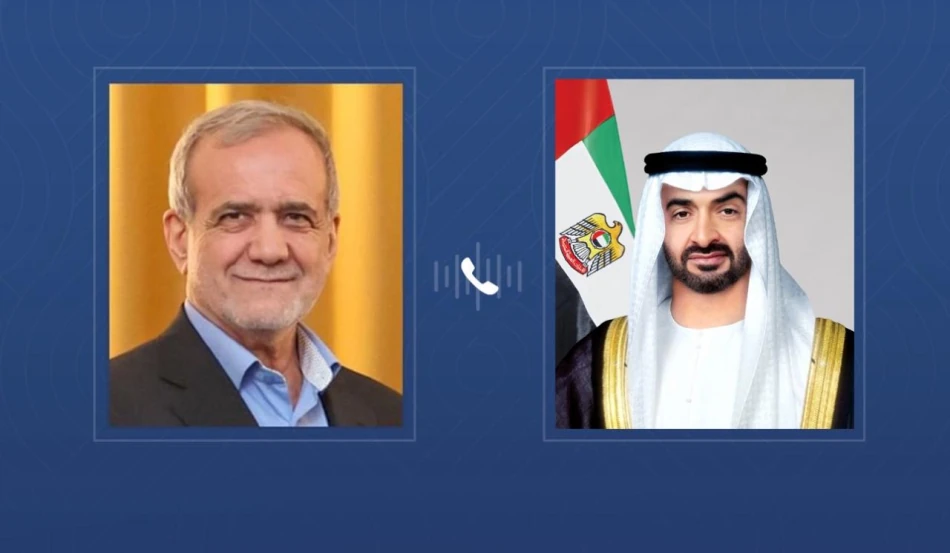
UAE President and Iranian Counterpart Discuss Bilateral Ties, Regional Developments in Telephone Call
UAE and Iran Signal Diplomatic Thaw as Regional Tensions Mount
UAE President Sheikh Mohammed bin Zayed Al Nahyan and Iranian President Masoud Pezeshkian held a telephone conversation focusing on bilateral relations and regional stability, marking another step in the gradual normalization between the Gulf state and the Islamic Republic. The call underscores the UAE's pragmatic approach to regional diplomacy as Middle Eastern tensions continue to escalate.
Bilateral Relations Take Center Stage
The leaders discussed strengthening ties between their nations in ways that serve mutual interests and benefit both populations. This conversation reflects the UAE's broader strategy of economic diplomacy, prioritizing trade relationships and regional stability over ideological differences.
The timing is significant. While many Western nations maintain strict sanctions on Iran, the UAE has positioned itself as a crucial trade partner, with bilateral trade reaching approximately $19 billion in recent years. This economic interdependence has created incentives for both countries to maintain dialogue even during periods of regional tension.
Regional Security Concerns Drive Dialogue
Middle East Developments Under Review
Both leaders exchanged views on regional and international developments, with particular focus on evolving Middle East dynamics. The UAE's emphasis on supporting peace and stability reflects its growing role as a regional mediator, distinct from the more confrontational approaches of other Gulf states.
This diplomatic engagement comes as the region faces multiple flashpoints, including ongoing conflicts in Gaza, Lebanon, and Yemen. The UAE's willingness to maintain open channels with Iran demonstrates its belief that dialogue, rather than isolation, offers the best path to regional stability.
Strategic Implications for Gulf Politics
Diverging from Saudi Approach
The UAE's continued engagement with Iran highlights a subtle but important divergence from Saudi Arabia's historically more hawkish stance. While Riyadh has recently begun its own diplomatic overtures to Tehran, the UAE has consistently maintained that economic integration and dialogue serve as better tools for managing regional tensions than military confrontation.
This approach has proven economically beneficial for the UAE, which serves as a key re-export hub for goods destined for Iran, helping Dubai maintain its position as a regional commercial center despite international sanctions.
Implications for Regional Stability
The UAE's diplomatic strategy reflects a broader shift in Gulf politics toward pragmatism over ideology. As regional powers increasingly recognize that military solutions have failed to resolve longstanding conflicts, diplomatic engagement offers an alternative path forward.
For Iran, maintaining positive relations with the UAE provides crucial economic breathing room amid international sanctions. For the UAE, these ties support its vision of becoming an indispensable regional hub that can work with all parties regardless of political differences.
Looking Forward
This latest diplomatic contact suggests both nations recognize the value of sustained dialogue, even as broader regional tensions persist. The UAE's consistent message supporting regional peace and stability positions it as a potential mediator in future conflicts, while Iran gains a valuable partner in its efforts to maintain regional influence despite international pressure.
The success of this pragmatic approach may influence other regional powers to prioritize economic cooperation and diplomatic engagement over confrontation, potentially reshaping Middle Eastern geopolitics in the coming years.
Most Viewed News

 Sara Khaled
Sara Khaled






